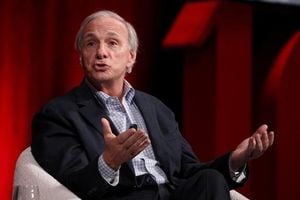In the thick of October 2025, as the United States grapples with a grinding federal government shutdown, the political theater in Washington has reached new heights. At the center of the spectacle stands former President Donald Trump, whose allies in Congress are now pushing for an extraordinary gesture: a House resolution to award him the Nobel Peace Prize. The move, announced by Representative Buddy Carter on October 10, comes at a time when the government’s basic functions are paralyzed and millions of Americans are feeling the pinch.
Speaking on Fox Business, Carter made his intentions clear. “Donald Trump deserves the Nobel Peace Prize,” he declared, adding, “That’s why I’m introducing a resolution today for a sense of Congress that will honor him with the Nobel Peace Prize.” Carter’s plan was to file the resolution immediately, hoping to see it brought to the House floor for a vote. If necessary, he said, he’d call for a discharge petition to force action. The timing, however, raised eyebrows. As pressing issues like reopening the government, passing appropriation bills, and swearing in new members await attention, some critics see the resolution as a distraction from Congress’s real work.
But how does one actually win the Nobel Peace Prize? According to Norwegian Nobel Committee Chair Jørgen Watne Frydnes, it’s not something that can be won through lobbying or congressional resolutions. “In the long history of the Nobel Peace Prize, I think this committee has seen many types of campaign, media attention,” Frydnes told reporters on October 10. “We receive thousands and thousands of letters every year of people wanting to say what, for them, leads to peace. This committee sits in a room filled with the portraits of all laureates, and that room is filled with both courage and integrity. So we base only our decision on the work and the will of Alfred Nobel.”
Trump’s quest for the Nobel has been anything but subtle. In July, he reportedly called Norway’s Finance Minister Jens Stoltenberg out of the blue to inquire about the prize, using tariffs as a pretext for the conversation. The former president has long chafed at not having his name added to the illustrious list of recipients—a list that includes Nelson Mandela, Martin Luther King Jr., Mother Teresa, Malala Yousafzai, and, notably, his political rival Barack Obama.
Undeterred by the committee’s cool response, Trump has repeatedly touted his own achievements in the realm of international peace. In recent months, he’s claimed responsibility for resolving eight global conflicts during his second term, citing peace between the Democratic Republic of the Congo and Rwanda, Cambodia and Thailand, Israel and Iran, India and Pakistan, Serbia and Kosovo, Egypt and Ethiopia, Armenia and Azerbaijan, and for brokering the Abraham Accords. Yet, despite these claims, the Nobel judges remain unmoved by campaigns or boasts, focusing strictly on tangible contributions to peace as defined by Alfred Nobel’s vision.
While Trump’s Nobel ambitions play out on one stage, the ongoing government shutdown offers him another platform to flex his political muscle and, perhaps more importantly, to pick enemies. According to reporting from The Hill, Trump has a knack for choosing adversaries that are difficult for his base to defend. This time, his targets include furloughed federal workers and popular Democratic programs.
“For the most part, we’re going to take care of our people,” Trump said regarding a plan to deny back pay to furloughed federal workers. “There are some people that really don’t deserve to be taken care of, and we’ll take care of them in a different way.” He was equally blunt about the shutdown’s impact on government spending: “We’re only cutting Democrat programs, I hate to tell you, but we are cutting Democrat programs,” Trump stated. “We will be cutting some very popular Democrat programs that aren’t popular with Republicans, frankly.” Infrastructure projects in blue states, for example, are squarely in the crosshairs.
With the help of Office of Management and Budget Director Russell Vought, Trump is pushing a shutdown strategy that would see favored Republican programs funded while others languish. The plan? Use the more than $30 billion a month collected in tariffs on U.S. imports to keep select parts of the government running. Of course, there’s a catch: without spending authorization from Congress, the Treasury Department can’t appropriate funds. But Trump’s willingness to sidestep congressional approval isn’t new—he previously redirected funds for his border wall during his first term, a move that drew both legal and political fire.
The shutdown’s fallout is already being felt. Military pay is at risk, with troops scheduled to miss their next paycheck on October 15. Air travel is also in jeopardy, as unpaid Federal Aviation Administration workers threaten to disrupt flights nationwide—a headache that affects Republicans and Democrats alike. The longer the shutdown drags on, the more some in the GOP seem to relish the standoff, seeing it as a way to pressure Senate Democrats to make concessions.
Yet, there’s a real danger in letting the shutdown become more than a bargaining chip. Economic indicators paint a grim picture: September 2025 was the worst month for hiring since the pandemic, according to data from the Carlyle Group. The manufacturing sector has contracted for seven consecutive months, battered in part by the very tariffs Trump proposes as a financial lifeline. Americans are taking notice. A Fannie Mae survey found that nearly 70% of Americans believe the economy is headed in the wrong direction, and 73% say it’s a bad time to buy a house.
Trump’s approval ratings reflect this malaise. As of early October, his average approval sits at 41.4%, with a net score of -14.6 points, according to an aggregation of polls from Ipsos/Reuters, Pew Research Center, NYT/Siena University, Marist College, and Marquette University Law School. Disapproval hovers at 56%, and the trend is downward.
The politics of picking enemies may energize Trump’s base, but it’s a risky strategy when the discomforts of a shutdown begin to affect everyday Americans. As The Hill notes, political independents and swing voters care less about which party suffers and more about their own well-being. If flight delays, missed paychecks, and economic uncertainty pile up, the pain could rebound on those in power—potentially shifting momentum as the 2026 midterms approach.
For now, Trump’s allies are betting that grand gestures—like a push for the Nobel Peace Prize—and hardball tactics in the shutdown will pay political dividends. Whether this strategy succeeds or backfires remains to be seen, but one thing is clear: the former president’s ability to dominate the headlines, for better or worse, is undiminished.




